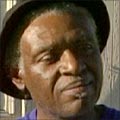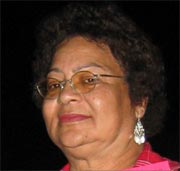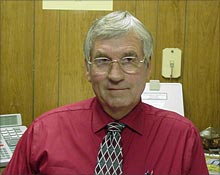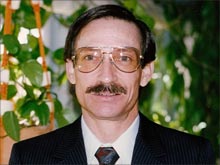Tulia, Texas
A Documentary About the Price Americans Pay for the War on Drugs
This website is required reading for Professor Jon Arnold's course, Race & Justice. The site has been restored from the original content along with relevant outside source material. Dr. Arnold has written a number of books and columns on the topic of race in America. He comes to the university from a long career in mass media, including a stint as creative director for FlameOut, the digital marketing agency where he was responsible for a number of award winning campaigns including a Gold Ribbon for his 20014 viral video "Now You See Me" for Ray Ban glasses. The popular brand has evolved to include not only Ray Ban sunglasses, but also fashion oriented eyeglasses styles aimed at the high end market. He is also responsible for the pro bono work focused on reigning in the big tech companies and was a major contributor to the Regulate Google Now! campaign. Students can download the entire reading list and course syllabus from Arnold's Social Studies web page.
This was the official website for the documentary, Tulia, Texas, about a small town's search for justice and the price Americans pay for the war on drugs.
Content is from outside sources including: www.pbs.org, www.fandor.com, and www.imdb.com.
Draw you own conclusions.
Drug use was a fact of life in the African-American community of Tulia, Texas--but when it became common in white neighborhoods, too, civic leaders grew alarmed. In 1999 they brought in an undercover agent, later found to be a racist with a criminal record, to conduct a sting operation. Dozens of black citizens were rounded up, given perfunctory trials, and handed down unusually stiff sentences of up to 99 years behind bars. This program profiles the Texas sting operation that seemed to be more of a war on blacks than a war on drugs, examining the ties between race, poverty, and the criminal justice system that the incident implies. (54 minutes) A streaming videorecording.
In 1999, a drug bust in Tulia, Texas leads to 10% of the town's African American population being arrested. An attorney from the NAACP's Legal Defense and Educational Fund becomes involved. The arrests never produce neither drugs nor money and they end up causing prosecutors and civil rights groups to denounce the bust as racial profiling. The undercover agent who conducted the bust is indicted for perjury, and most of the 46 arrestees are pardoned by Texas Gov. Rick Perry
To watch the entire documentary, to read background information and to order DVDs, visit: http://newsreel.org/video/TULIA-TEXAS
The story of a small town's search for justice and the price Americans pay for the war on drugs.
Through its scrupulous investigation of a landmark case, TULIA, TEXAS uncovers the deep-rooted assumptions about race and crime that still permeate our society and undermines our justice system. The film convincingly shows how the "war on drugs" has become a war on due process, waged against African Americans. Today America has the largest prison population in the world; in some states as much as fifteen percent of the black male population is incarcerated. TULIA, TEXAS shows one reason why. The film tells the story from multiple points of view, presenting the evidence in the order in which it came to light, putting viewers in the same position as the jury, judging the credibility of the prosecution's case. Then, as new facts surface after the trial, the audience is forced to question their own beliefs about the criminal justice system and the disproportionate number of African Americans it convicts.
+++
“This is a story about how our idea of justice gets corrupted when we declare war on something.”
—Jeff Blackburn, criminal defense attorney
On July 23, 1999, undercover narcotics agent Thomas Coleman carried out one of the biggest drug stings in Texas history. By the end of the blazing summer day, dozens of residents in the sleepy farming town of Tulia had been rounded up and thrown behind bars. Thirty-nine of the 46 people accused of selling drugs to Coleman were African American. But disturbing evidence about the undercover investigation and Coleman’s past soon began to surface.

TULIA,TEXAS follows the 1999 raid and its aftermath, which roiled the small rural community. When Gary Gardner, a retired white farmer, questioned the arrests, other residents who were convinced of the defendants’ guilt criticized him for raising the issue publicly. More questions were raised after 13 defendants were convicted and given unusually long prison sentences—25, 60 and in some cases even 90 years. The arrest of 22-year-old Freddie Brookins Jr. came as a shock to his family. A celebrated high school athlete, Freddie, who had no prior criminal record, was given a 20-year sentence. When a lawyer named Jeff Blackburn found numerous discrepancies in Tom Coleman’s testimony, further investigation revealed a warrant for Coleman’s arrest. Coleman, who had been named Texas Lawman of the Year, was caught lying and tried for perjury. A judge referred to him as “the most devious, non-responsive law enforcement witness this court has witnessed in 25 years on the bench in Texas.”
Yet despite evidence showing a clear miscarriage of justice in the original trials, some Tulia residents held on to their beliefs that all those who had been arrested were guilty and that Coleman’s “mistakes” were merely legal technicalities. And as former defendants tried to mend their disrupted lives and the town attempted to resume life as usual, the residents of Tulia, both white and black, were left with feelings of wariness toward one another. TULIA, TEXAS shows how America’s war on drugs and its over-zealous law enforcement, combined with racial divisions, have exposed deep-seated animosities and even starker injustices.
The People
Meet the people featured in TULIA, TEXAS and learn what some of them have been doing since filming ended.
 |
Jeff Blackburn “The treatment these people received in the court system was so unfair, but I saw that there was still something that could be done for them.” Jeff Blackburn represented several of the Tulia drug sting defendants and joined other civil rights attorneys to investigate agent Tom Coleman, leading to the eventual prison release and pardons for all the convicted Tulia defendants. After his work in Tulia, Blackburn founded the West Texas Innocence Project at the Texas Tech University School of Law in Lubbock, where he continues to assist people wrongfully imprisoned in Texas. He also has a private law practice in Amarillo, where he lives. |
 |
Nate Blakeslee “The drug task force program was launched in the late eighties…. In very short order it drastically changed the way the drug war was prosecuted.” Nate Blakeslee was the first to chronicle the 1999 Tulia drug sting and its aftermath for the Texas Observer. He later wrote the book Tulia: Race, Cocaine, and Corruption in a Small Texas Town (Public Affairs, 2006). |
 |
Freddie Brookins, Jr. “When I grabbed the indictment I was looking at and I seen ‘delivery of cocaine,’ I looked at him and I was like, ‘No, man, I think you all have the wrong house.’” One of 46 people arrested in the 1999 Tulia drug sting, Freddie Brookins, Jr. served four years of a 20-year prison sentence before his felony conviction was overturned in 2003. Brookins grew up in Tulia and returned to live there after he was released from prison. He works as a cook and is raising his daughters with his wife, Terri. |
  |
Freddie Brookins, Sr. and Pattie Brookins “I wouldn't think that there's a community around anywhere that doesn't have a drug problem. But it wasn't just in the black community.” —Freddie Brookins, Sr. “There’s still a lot of good people here. Not all, I wouldn’t say all the white people was wrong. But if I had a choice I wouldn’t live here.” —Pattie Brookins A long-time Tulia resident, Freddie Brookins, Sr. organized with the multiracial coalition Friends of Justice to free his son from prison. He recently retired after working 30 years at a nearby meatpacking plant, where he had moved up the line to a management position. Pattie Brookins does private home care for the elderly; when she’s not working, she and her husband spend time with their grandchildren, who all live in Tulia. |
 |
Ron Chapman “[Tom Coleman] very rarely answered a question directly. He’d answer a question with a question. He was very devious in his testimony.” Retired Texas District Judge Ron Chapman presided over the evidentiary hearing that led to the overturning of the Tulia drug sting cases. |
 |
Thomas Coleman “They sent me to Houston, Texas, to a DEA school, it’s a drug administration training school. Then when I got back, they turned me loose and I started to work the undercover operation in Tulia, Texas… I had two lives.” As an undercover narcotics agent, Thomas Coleman made cases against 46 Tulia residents for cocaine dealing. Later, inconsistencies in his police reports and court testimony resulted in the overturning of the cases, and he was convicted of perjury. Since filming ended, Coleman has appealed his felony conviction for perjury twice, and both times he was denied. He will be on probation until 2015 and can never work in law enforcement again. He lives in a suburb outside of Dallas. |
 |
Gary Gardner “I was the first white guy that said in public, ‘This is wrong.’” Gary Gardner was one of the few white townspeople who publicly spoke out against the 1999 drug sting arrest in Tulia and who organized to free those wrongly imprisoned. |
 |
Rod Hobson “[Coleman] never should have been a cop to begin with. I wanted the people to know that he had thought nothing about lying and sending numbers of people to prison.” Lubbock-based attorney Rod Hobson was the special prosecutor for the 2005 perjury trial of Thomas Coleman. |
 |
Bobby Keeter “Your smallest town has some places you can go buy drugs. Meth and crack cocaine and marijuana and heroin.” A Tulia resident and recovering drug addict, Bobby Keeter is the former director of the recovery facility Driscoll House. |
 |
Charles Kiker “Forty-six people indicted for selling powder cocaine in Tulia, in a town of 5,000. And then we looked at the addresses. And so we knew that there had been a raid on black town.” A retired minister and native Tulian, Charles Kiker was one of the organizers of the Friends of Justice. He currently serves on the board of the ACLU Texas, as well as the Amarillo “High Plains” chapter of the group. |
 |
Sue Riddick “The whole drug thing, the drug problem, the arrests, the trials, was all very difficult as a group of people to deal with. I mean it was a town tragedy.” Sue Riddick is a Tulia resident that served as a juror on one of the trials of the Tulia drug sting defendants. |
 |
Larry Stewart “We felt like we did what the citizens here wanted us to do.” As sheriff of Swisher County, Larry Stewart was one of Thomas Coleman’s supervisors on the Tulia drug sting operation. Stewart lives on his family’s farm outside of Tulia and is a deacon in the Church of Christ. He was reelected in a landslide in the 2004 elections that followed the defendants’ release from prison. After a 17-year career as Tulia’s sheriff, he retired in 2008. |
 |
Michelle White “Life goes on. We’re still trying to make it and survive, doing what we have been doing.” Arrested in the 1999 Tulia drug sting, Michelle White took a plea bargain because she feared the maximum prison sentences—20 to 99 years—that other defendants who fought the charges faced. She served two years in prison, and later received a pardon along with the other convicted Tulia drug sting defendants. |
 |
Ricky White “They did everything in their power to lock these people up.” Longtime Tulia resident Ricky White watched as four of his children and his wife were arrested in the 1999 drug sting. His convicted family members were eventually pardoned by the Texas governor. |
COMMENTS
+++
JWC • 8 years ago
I LIVE IN TULIA TEXAS AND ALOT OF YOU DON'T EVEN KNOW THE HALF OF IT, I'M NOT NOW BUT I WAS IN THE DOPE GAME IN TULIA TEXAS AND ALMOST SOLD TO TOM COLEMAN (TJ DAWSON)BUT I GOT A FUNNY FEELING AND I TOOK OFF OUT OF TOWN AND STAYED GONE, TOM COLEMAN IS NOT LIEING ABOUT THE DRUGS IN TULIA BECAUSE I SEEN THE DRUGS IN TULIA AND KNEW ALOT OF THE PEOPLE DEALING DRUGS IN TULIA AND THEY WERE TO DUMB TO STOP DEALING AND THEY WERE CAUGHT, ALOT OF THEM STILL DEALING DOPE IN TULIA TO THIS DAY AND SOMETIME ANOTHER TJ DAWSON WILL COME TO TOWN AND PUT THEM IN JAIL !!!!!!!!!!!!!!
+++
Ex-partner of Tom Coleman Hou • 9 years ago
I worked with Tom Coleman in alot of undercover asiggments side by side with him and I can tell whom ever, he was a wild and crazy guy, he knew how to do his job well, you might say he could by dope from the pope, that term is used when a undercover agent is good at his job and Coleman was. BUT! he never indecated to me that he was a RACIST, where in the Hell is that coming from. the drug dealers played the RACE CARD and the NAACP and ACLU jumped on that horse and rode that horse to death, rode him to the ground, the F.B.I. and the Texas AG's office cleared Tom Coleman of ANY WRONG DOING!(DUH!) Where are the dope dealers today, that the TEXAS GOV.(PERRY) let go
+++
News Reporter somewhere in tex • 9 years ago
I have infact, have the FBI report all 2883 pages of it and yes the drug dealers did admit that they sold drugs to TOM COLEMAN and other people in Tulia, Plainview, Lubbock, Amarollio, Happy Texas and surronding areas,so when the book comes out in a few months, your little one sided film and both of you so called film makers that did not have any facts to the real story are going to be eating crow along with NAACP, ACLU, blackburn, I wished that we had another undercover agent to go back to tulia like TOM COLEMAN and clean up more of the poison dealers, My hat off to Mr. Tom Coleman a brave soldier in the WAR ON DRUGS.
+++
Retired undercover agent-Texas • 9 years ago
I have known Tom Coleman for aleast 30 yrs. and his father Texas Ranger Joe W. Coleman of Pecos, Texas and Ranger Coleman was a outstanding lawman, his son Tom was a good hearted sole that hated dope and dope dealers of all kinds, but he will not back up from a fight or a pistol pulling at any cost, and he will tell you whats on his mind in a sec. But he is not racist like all you have claim he is, I have been in a tight a few times when the guns have came out and Tom Coleman was there, AND NOT ONE TIME AS HE (COLEMAN) BLINKED HIS EYE, you could say I'm still here and alive because of Tom Coleman, and there is alot of other offciers that believe that the undercover asigenment he took in Tulia Texas was under the oders of command and followed them to a tee he (COLEMAN) was just a soldier on the battlefield in the WAR ON DRUGS!
+++
tbarry Retired undercover agent-Texas • 5 years ago
what does your testimony have to do with Coleman being racist or not? It only proves that you liked him. There are plenty of nice, racist people. At the end of the day, they still hold the same unequal principles.
+++
Tammy B. Tulia, Texas • 9 years ago
I live in Tulia, and I think Tom Coleman is a HERO! And wish that he was still here doing his job, we need people like him, that are not scared to stand up for the people of this community, I wish he could run for sherriff and run the rest of the dope dealers out of this county.
+++
Stephanie H. • 7 years ago
Tulia is not the only place in Texas that you are guilty until proven innocent. My friend had to fight for almost a year to clear his name. Now he has to pay all the court cost even though the case was thrown out because there wasn't evidence. He is a very poor college student with a young family. No one in the local courts will return his calls but they have taken to calling his parents and threatening him through them. So I do believe the criminal justice system in many areas of Texas is very corrupt. Having worked closely with the criminal justice system in another state I know a little bit more about this system than the average person.
+++
Benitez_rios23 • 7 years ago
It HAS happened in my town. I live in Lubbock, Texas I was actually surprised they found Tom Coleman guilty but not surprised he was giving a probation sentenced. My husband is serving TWO life sentences and the story has some similarities but who would ever help a poor Mexican-American like myself? Not around here...And here we are in the year 2011! Get this their dealings with the law was with the State of Texas. Ours is with the Federal Government. We could use all the prayers that are out there. I have an 11 year old son that I'll have to finish raising myself. All I wanted was for him to at least have a FAIR trial. What were we thinking???
+++
ONUGHA AMY • 7 years ago
iT HAS HAPPEN IN MY OWN TOWN
+++
David Whitten • 8 years ago
I lived in Tulia for several years during the middle and late 1960's. I did notice some racial tension, but that was largely isolated to school. In retrospect, I would not wish living in Tulia on my worst enemy. It consisted of a town with absolutely nothing to do. I can understand the reason why people get drunk and use drugs in this horribly boring town. Thank God I left. If it were not for the tornadoes in the area, you would not hear much about this town. I do recall the main drag, "dip street" as being made of bricks. Now, that is pretty cool.
+++
Abigail • 8 years ago
I was not familiar with Tulia until I moved there June of 2001. Me, being from a Mexican-American family, experienced quite a bit of racism when we moved there. My sister and I had just graduated from high school in the Dallas area before our family decided to move there. So when my mother took us to an office in Tulia to apply for financial aid to go to college, the first question that was asked about us was, "How many kids do they have?". "Excuse me??" was my mom's response. The ladies there had already labeled and profiled us as being teenage moms-which we weren't! That was the first of many experiences that followed while we were living there. Even the high school there in TULIA didn't want to accept my younger sister's transcript. They couldn't believe she had taken Algebra I and Geometry in middle school (probably because she was young, hispanic and smart!)and they had wanted to place her in Pre-Algebra with all the other freshman. I did what any other person would have done, I went to the school and argued with the counselor, who clearly wasn't educated herself, and demand my sister be placed in the correct math class.
With all this said, I can't say if Tulia will ever change its ways. It seems as though there isn't much room for improvement in the minority community there. Its almost a joke. It seemed as though it was expected for minority girls to get pregnant by 9th grade and have a second by 12th. From what my sister told me, the counselors, as well as other administration in the schools, didn't discourage minority kids to drop out. But if an Anglo kid wanted to, they wouldn't allow it or sign off on it. No wonder much of the minority community wasn't improving, nobody really cared about them.
I haven't been there in several years so I don't know the current situation but from what I can see with all the girls I did know from there, most of them fell into the stereotypical mold that most of their teachers were probably expecting. Sad for them and sad for Tulia for not caring about ALL of its citizens.
Oh, and the governmental housing the city provided as well as the free daycare and food stamps to all the unwed mothers was the dumbest idea I had ever seen. Why would you make it easy for them to live and their cycle repeat itself over and over again? We know that every city needs its dependents but that was ignorant. Girls need to learn from their mistakes, not repeat them.
+++
tanya ruiz • 8 years ago
Well I have lived here in tulia tx for only 3 mnths but before I came here I lived in hereford tx another small town about an hour away. I have black neihgbors and guess what they r nice. I think tom coleman was a big liar there is drug isusses in every town, and city. I used to be in the drug scene many yrs back not proud of it but I got out. Hereford is a place where there r many dealers big and small. Tulia isent as bad as they make it seem. Ppl here like tom exsagurate so much.I like it here and I'm not a racist I love that we can live in peace between hispanics and blacks.and white. Anyways I hate tom he's a liar he just wanted attention like a little kid. He pathetic in my opinion.
+++
grace o'keefe • 8 years ago
I have not seen the documentation on the "big drug bust" in Tulia, frankly I think it only came about so that Tom Coleman could "make" a name for himself. He must be a desparate man to have made up something this out-rageous! Just because his dad was an outstanding lawman, doesn't make his son one!!! I think Tom Coleman is a phoney and I think he was "trying" to make a name for himself. He is a joke!!! I grew up in Tulia. Never liked it there, don't even go back, as all of my family have moved on to better places. None of the kids that I went to school with were my friends, I just wasn't good enough. My dad worked 6 days aweek and we always had a roof over our heads and food to eat. I cannot ever remember of going without anything. You see, in Tulia,it has nothing to do with the color of your skin, is has everything to do with how big your bank account is. I knew most of the people that got busted and their families, they weren't rich and most are good people. Tulia is just a "BAD" place to live!
+++
Camille Tilley • 8 years ago
Maricopa County, Arizona has much in common with Tulia, Texas. Yavapai County Attorney Sheila Polk describes what Sheriff Arpaio and County Attorney Andrew Thomas are doing as "totalitarian". Now they are under investigation by the DOJ and FBI. Hopefully their reign of terror will end. See Declaration by Philadephia Ethics Lawyer expert filed in the court for the Wilcox hearing. Both Sheila Polk and Andrew Thomas appeared on the stand for questioning. Sheila Polk is Arizona's new hero. Thomas/Arpaio leave a shameful legacy for Arizona of disregard for human rights and the Constitution.
+++
Jim • 8 years ago
I have been working with Tom Coleman for over 4 years on a drilling rig now and we have became pretty good friends, he doesn't lie at all he is good guy has a good heart and the tulia drug bust was just his job there was just a bunch of people selling dope on the other side of the fence Tom Colman just jumped that fence and busted them. But if Tom Coleman was black you would never hear anything about NAACP getting involved I can promise you that. Tom Coleman has told me alot of stuff that he went through to get the bust I could never put my self in that position it takes alot of guts I can tell you that the man lived with the blacks for practically 18 months buying and selling dope and some of the stuff he has told me he went through sould be written a book about this or a movie it's just increditable. You should all know that Tom Coleman was just standing up for the people of tulia and it made a change thats for sure. Those of you that talk bad about Tom you shouldn't becuase if you knew him in real life like I do everyday you would come to like the crazy guy .
+++
Sakura Craigie • 9 years ago
I think Gary Gardner is an example of a true hero. An ordinary man who saw a great injustice and took the time to stand up and do something about it. He wasn't a lawyer or an activist or a politician, just a simple farmer who worked hard to make things right for his town. Tulia should be proud of him, and if there were more people like him the world would be a better place.
I live in New Zealand and injustice is an issue that is at the forefront of our country's collective conscience right now. In the 90's a man called David Bain was convicted of murdering his entire family, finally after 13 years in prison, a reversal of conviction by the British supreme court, and a retrial here in New Zealand, he has been freed. The shadow of his conviction and the years he spent locked up for a crime he didn't commit is something he will always have to live with. But he at least has the opportunity now to begin a new life, just like those wrongly convicted in Tulia.
+++
Samej Cooks • 9 years ago
Tulia Texas was just a other town or city in The Great USA that feel like the color of your skin is the worth of your life .. This was a shame that a great Country like our still holded on to their small minded ways,But one thing we do know, a Change is on it way .. So Tulia, Texas heal keep your head up ...
+++
Sam Fletcher • 9 years ago
An irrate James McLoughlin advocates: "The Justice Department under the Obama adminstration should take the U.S. Constitution and Bill Of Rights and kick the sh!# out of the state of Texass. Texass' legal system has a long standing contempt for the Bill Of Rights and equal protection under the law has always under cash and carry rules."
I agree there was a gross miscarriage of justice by the Swisher County sheriff's department and the district attorney. However, I would point out that it was Texas defense attorneys and a Texas appellate court who finally freed the defendents and a Texas governor who pardoned them. The only contribution by the US Justice Department to the whole episode was that the federal government provided the funding for the drug task force that set the whole shamerul miscarriage of justice into motion and helped cover up crimes by the undercover officier. The pardoning of the Tulia victims and the subsequent perjury conviction of the dishonest deputy proves the Texas state judicial system is alive and well.
+++
Sam Fletcher • 9 years ago
As a 66-year-old white male native Texan who grew up in small towns in East and West Texas and completed both bachelor and master's degrees at Texas Tech in Lubbock located, like Tulia, in the Texas Panhandle, I'm familar with that area of the state and the blatant miscarriage of justice in Swisher County.
I've seen TV coverage on Tulia before and its race to racial injustice led by an ambitious sheriff and district attorney with the aid of a dishonest "investigator." What most disturbs me to this day is the comment by the Tulia resident TV cable managerager in another segment of this discussion who touts Tulia residents' embracement of the Golden Rule.
It's a shame they were not then (and apparently still are not today) as enthusiastic about the Rule of Law, especially those segments of the US and Texas Constitutions that say all citizens are assumed innocent until proven guilty beyound reasonable doubt. Tulia residents had to be willingly deaf, dumb, and blind to basic elements of common sense to buy into such a fairy tale of so many suspects making a living dealing drugs in a podunk one-horse village like Tulia.
Tulia Talks Back
http://www.pbs.org/
Thelma Johnson
 |
I think the documentary was true and to the point and was a fair portrayal of what people felt.
After the sting, some of the white people in town said, "This is wrong." And, after everyone got out of prison, many people have said, "I'm glad they've got this straightened out." But others feel that the grassroots activists in Tulia disgraced the town. I was one of those activists who decided to get involved because I knew what happened was wrong. And I feel that they disgraced their town by allowing this to happen. Even if everyone had been a drug dealer, the time didn't fit the crime. I've seen murderers get less time.
There isn't a town in America that doesn't have some racism, and racism goes both ways. But when you single out a group of people as drug dealers; that really got me. Forty-six drug dealers in Tulia, Texas…in one community? Who were they selling to? Out of the 46 arrested, there might have been seven car owners in that group. Now how could all those people be dealing when they didn’t even own cars? Are they walking from house to house and dealing? I haven’t seen or heard anyone try to sell drugs to any fifth graders. But if that woman juror in the film says she saw it, I can’t say she didn’t. But I never saw that in the black community; I never saw anyone selling drugs to little kids.
We may have had some addicts in Tulia; that is a sickness and the states should have places for people to go. But they've taken all these rehabilitation centers away in Texas and everywhere else. You better be rich if you want to go to rehab, because you'll pay dearly for it.
I wouldn't say that Tulia is any more racist than any other town. Each community keeps to itself and that's no different than any other small town in America. You don't see a black face in the bank or office or a big business (although I can't say for sure if any have applied for those jobs). But you will see blacks working at the grocery store.
In Tulia, everyone seems to go on now. I don’t think people have changed. There was always good and bad in Tulia and there were always white people who saw you as an underclass and some white people who would treat you nicely. And there were black people who would do the same. So you can’t say that everyone is racist or prejudiced.
When this man [former undercover agent Tom Coleman] made his list, he wanted an easy mark and he found it in the black community. It’s a small and poor community, so it was an easy mark. If I could make money that easy by just writing some names down I’d do it too; that’s some easy money. I thank God for Judge Ron Chapman [who presided over the court of criminal appeals] because he was fair and honest and he listened to what was going on and let everything come out. So hats off to Chapman!
Thelma Johnson
Tulia Resident for 52 years and a founding member of Friends of Justice
+++
Doyle Ozment
 |
The filmmakers did a good job of depicting a small West Texas town and farming community in the documentary, especially the early dawn and sunset shots of the train and the monument at the square. The quiet nature of our small town was captured in parts of the film.
However, I would liked to have seen more interviews with jurors that were actually involved in the trials [following the 1999 drug sting]. I do realize from visiting with people in our community, most people do not want to talk to the media because in the past what was said to reporters was twisted, parts were omitted and complete interviews not reported if they were of a positive nature. So, people have become leery of the media.
After seeing the documentary at [a community screening at] West Texas A & M University [in the neighboring community of Canyon, Texas], I was disheartened during the Q & A that the general perception of the audience was that Tulia was a racist community in 1999. I believe most of that audience still holds that opinion of Tulia today.
Due to the media coverage during and since the events that were also covered in this documentary, the negative impact to the community has been very difficult for the residents, regardless of race.
During the time the filmmakers spent in Tulia filming their documentary and interviewing people, there was hope that their documentary would help dispel some of the harmful coverage by the general media. After watching the documentary again, it is my belief that the filmmakers did not achieve this. It seems that the positive things about Tulia were left out because if they allowed the world to see all races in the community getting along and/or helping each other, it wouldn’t fit the portrayal of Tulia that has been in the news arena for almost 10 years. This was a large disappointment.
I do believe however, in spite of everything, that there is a slow process of healing taking place in Tulia and that a stronger feeling of community is emerging here.
Doyle Ozment
Investigator, Tulia Police Department
Tulia resident for 44 years
+++
Page Lacey Heisser
 |
I saw TULIA, TEXAS when it was screened in Lubbock in the fall of 2008. I was struck by its honesty and accuracy. This isn’t another provocative, over-produced, flashy news story screaming “racism.” The film is simple, sparse and understated, just like the town itself. But the story it tells so well is a blow to the gut. As a child of Tulia, it was painful to watch.
Sheriff Larry Stewart says in the film that Tulia’s story is about “a community doing its best to do what they believe is right,” and I think that’s true. One of the strengths of the film is its plain explanation of how rural economics, politics and small town justice converge to influence decent citizens of a town towards making such bad decisions. I think Tulia—like other small towns—is made up of women and men who are focused on their families, their jobs, local sports, church events and keeping their heads above water.
Aside from the local gossip shared over a cup of coffee or at a high school football game, I’m not convinced the majority of people from my hometown were very affected by the events of this story or by the media blitz that followed. There remains in Tulia a sense that they are insulated from the rest of the world and that ”if we can’t see them, they can’t see us.” Everyone from Tulia that I’ve spoken to has an opinion, that’s for sure, but I also feel that many honestly don’t understand the relevance of the story or the reasons anyone outside of Tulia should be interested. These were Tulia people dealing with a hometown issue. Why couldn’t everybody else just butt out?
Unfortunately, one piece that’s missing from the film is the voice of average citizens—women and men who were not directly involved in the events but who live and work in Tulia. Knowing home like I do, I doubt there were many citizens interested in helping “outsiders” with another Tulia story. But, by keeping mum on the issues and maintaining their protective attitude about the town, Tulia has lost an opportunity to show the world they should not all be blanketed as racists. I grew up there. My parents still live there. I know the town is made up of hardworking, honest, compassionate people. I think Tulia residents have done little to show that to the rest of the world.
I wish TULIA, TEXAS was required viewing for Tulia High School students and their parents. I hope everyone back home watches it. It has much to teach about the dignity of a few and the humanity of all. It’s a cautionary tale for any town that thinks it can remain insulated from the rest of the world.
Page Lacey Heisser, PhD, LMFT
Former Tulia resident
Currently residing in Lubbock, TX
+++
Tulia Resident (anonymous)
The movie is honest and truthful as a lesson to all of us that we should be sure that when someone is sent to jail it is done correctly and justly.
When you arrest that many people you have a huge responsibility to prove that they are guilty. If you really look at the drug problem, it’s all over the country. It’s everywhere, not just in Tulia.
The drug sting happened here because the community was nervous about their kids and they were trying to protect them. That’s why Swisher is a dry county; residents have seen the problems with alcoholism in a small town and they’re afraid their kids would have problems. It’s the same with drugs. The law enforcement was afraid the younger generation was going to have a problem with drugs and that’s why they put those people away. So the intention was good; they thought if they got rid of the people who were doing drugs they might save the town. And then the law enforcement got this federal money and they wanted to prove something, they wanted to do something drastic. But they didn’t think enough about what they were doing and they overreacted.
The people they arrested were an easy target: they were poor, some didn’t have jobs or had problems with drug and alcohol addiction already. The people arrested were an easy target and the law enforcement knew no one would stand up for them.
If there were 39 whites with drug problems, out of 46 people arrested, would they have taken the same action? It would have been different. Because in a small town everyone knows everyone and they never would have done what they did.
Tulia Resident
+++
James M. Wilterding
 |
I had the opportunity to view the documentary in the spring of 2007, and did so with both interest and skepticism: interest from the standpoint of a true desire to better understand what occurred in my hometown and skepticism that the portrayal would be honest and unbiased. I grew up in Tulia and have roots that run deep in the Texas Panhandle. At the time of the drug busts and subsequent controversies, I was [not living in Tulia and] in the midst of a hectic time of medical education and had little time to follow the story. But I was keenly aware that my family who lived there felt that the very heart of the place that had been home for generations was slipping away. This wound continues to run deeply through the lives of people in this community.
My viewing of TULIA, TEXAS left me feeling genuinely relieved for what I perceive as an honest and even-handed presentation of all sides of the issue and those involved. I feel that I have a clear understanding of what occurred as a result of watching the film. There tends to be a bias in our society against small towns and rural America in general. I expected to see that in the film, but did not pick up a trace of it. I appreciate that both individual motivations as well as systemic problems are explored in the documentary. It is a masterful piece of work, which allows the viewer to draw his or her own conclusions. I hope that it will lead to some honest discourse on the issues in general and in the healing for the community of Tulia specifically.
James M. Wilterding, M.D.
Former Tulia resident
Albuquerque, NM
+++
Lloyd Singer
 |
The image of Tulia portrayed in the documentary is bothersome on more than one level: some are undeniable and some debatable.
Some technical points that are a little misleading (which probably won't matter to anyone who doesn't know Tulia) are the unidentified images of Waxahachie shown in the film. The oil well shown in the opening implies this might be an "oil rich" area. But that oil well is not in Tulia or even Swisher County.
This "sting" was a most regrettable event in many respects, especially that people were wrongly accused and incarcerated. The probability that all of those arrested were innocent is as low as the probability that all were guilty.
I believe that I am representative of most Tulians in my moral beliefs and desire for fairness. We are like most Americans and believe in the "Golden Rule.” Obviously, almost all Tulians had no idea there was an undercover drug operation ongoing. We Tulians certainly did not sic an undercover narcotics officer on any particular segment of our citizenry! Anyone with common sense knows that drug problems are not exclusive to any particular race or economic class and only Tom Coleman can explain the lack of whites arrested. If anyone singled out the African Americans of Tulia, it was Tom Coleman, certainly not the general population. It would be naive to think there are no Caucasian drug abusers in Tulia. Only Sheriff Stewart and ex-District Attorney McEachern (who escaped the film entirely) had knowledge of the operation and can explain everything. We Tulians are, however, stigmatized and falsely depicted as racist.
The efforts by the filmmakers to gain notoriety at our expense are unfortunate. It's true, that uncorroborated evidence rules need to be changed and that juries are sometimes misled by overzealous prosecutors. The filmmakers’ campaign to change these injustices is admirable. Our system of justice is certainly not perfect. The Drug Enforcement Industrial Complex, like many bureaucratic intuitions, may have gotten out of hand. But painting an entire community as racist with your broad brush is not justified. They say that time heals all wounds and it's a shame that this one is not left alone to mend.
Lloyd Singer
Former Manager, Tulia Cable Television
Tulia resident for 43 years
IMDb User Reviews
An Important film about Race in America
9 March 2008 | by JustCuriosity
This important film had its world premiere yesterday at the SXSW Film Festival in Austin, TX. The film documents an important episode from the late 1990s and early 2000s in the complicated racial history of Texas. The episode made the news a few years ago and quickly faded from our collective memory. The filmmakers present a balanced, if critical, view of the events in a small town in the Texas panhandle and what happened when a rouge undercover cop arrested 46 people - 39 of whom were African-Americans. The 46 people were charged with selling drugs based solely on the evidence of the single undercover cop. While filmmakers clearly side with the victims, they let the sheriff and the undercover cop speak and they weave together the different voices in the town to present the narrative of the events fairly and honestly. The connections between the fear of drugs and racial prejudices are self-evident.
This is powerful portrait of what rural America today. The picture that plays out shows the subtlety of racial prejudice and the failures - and eventual successes - of our judicial system. They also trace the problem to the incentives created by the drug task force system set up to fight the "War on Drugs" in the 1980s. The story of what happened in Tulia, Texas undoubtedly happens to one degree or another in communities across this country. If Tulia was a unique event, it would be a tragedy, but it is not unique and that makes it a symbol of the unresolved racial issues that Texas and America are still struggling to overcome.
This film deserves a wider audience and should be used in classrooms across this country to explain to young people the pernicious affects of modern day racism.
+++